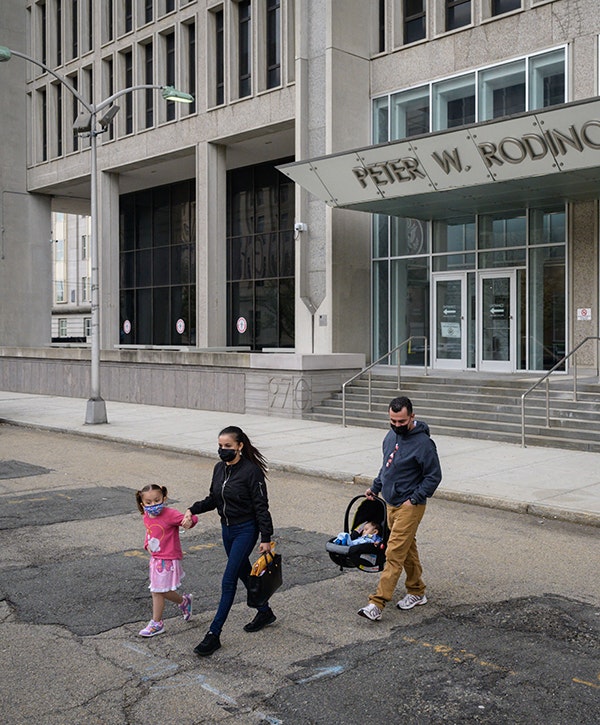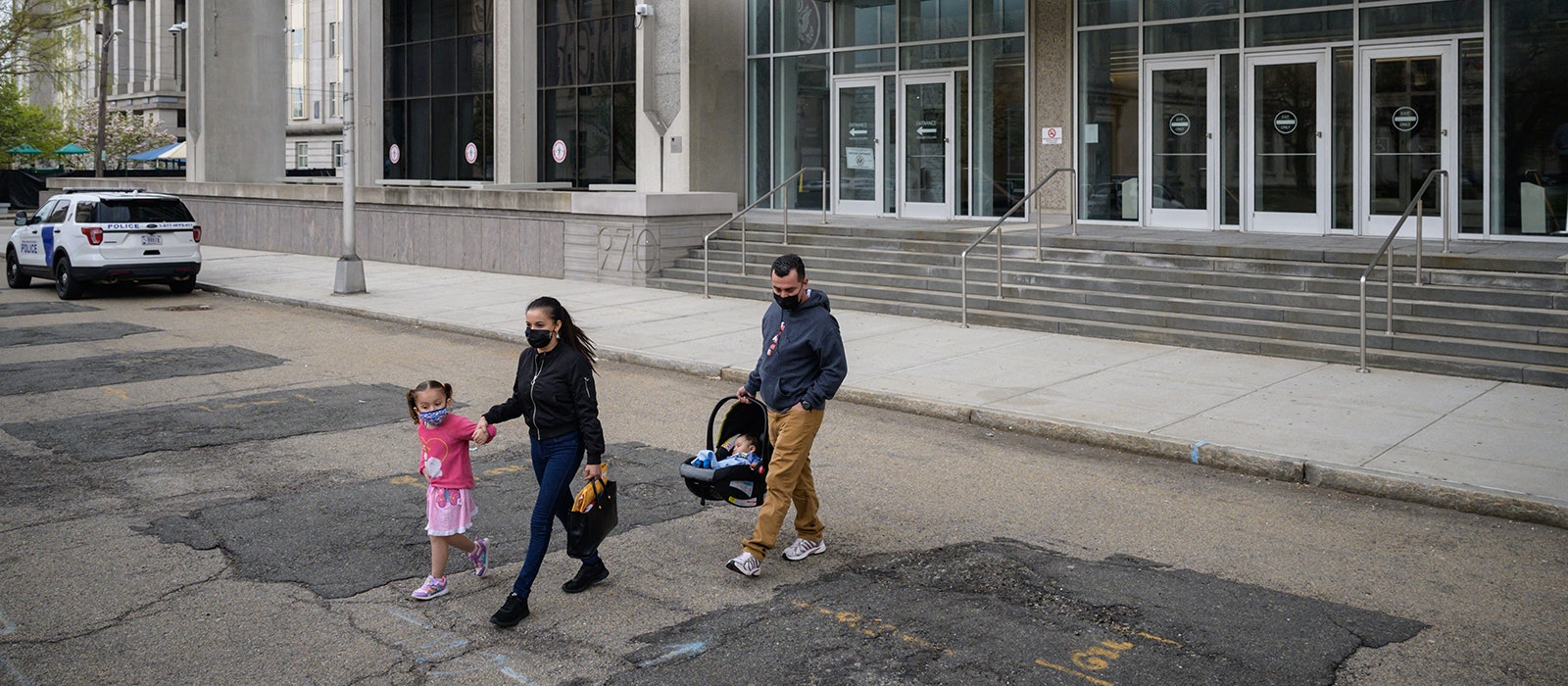Immigration parole is a long-standing legal authority that provides the U.S. government with discretion and flexibility to allow individuals to enter the U.S., temporarily and case by case, for “urgent humanitarian reasons or significant public benefit.” Parole has proven a critical tool in managing increases in the number of people arriving at the southern border. The Biden Administration should continue to expand its use of parole and maximize its effectiveness.
Immigration Parole
Policy Brief


“Parole is granted case by case if immigration officers determine there are “urgent humanitarian reasons or significant public benefit.”
Parole is a long-standing legal authority
Immigration parole is a process in immigration law (8 U.S.C. 1182(d)(5)) that authorizes immigration officials to allow people facing extraordinary circumstances to enter the United States temporarily.1 Parole is granted case by case if immigration officers determine there are “urgent humanitarian reasons or significant public benefit” to warrant allowing the individual to enter the country.
Immigration authorities typically grant parole for urgent, short-term situations, for example, someone facing a health emergency who is seeking medical treatment in the U.S. Parole processes can also be established by the Department of Homeland Security to provide humanitarian relief in emergency situations for individuals who are fleeing danger or persecution but cannot access the existing immigration pathways.2
This authority to grant parole was established in the Immigration and Nationality Act as passed in 1952. Until the passage of the Refugee Act of 1980, immigration parole was the primary mechanism for admitting refugees into the United States. Despite numerous legislative changes to parole over the years, Congress has maintained this authority, protecting flexibility and discretion in cases where an individual might not be eligible to enter the U.S. under the strict requirements of existing legal immigration avenues.
Over decades, administrations led by both parties have exercised parole authority for a variety of purposes, including reuniting long-separated U.S. citizens and permanent residents with their immediate family members from Cuba or Haiti while they wait in visa backlogs, or providing limited deportation relief for individuals who served in the military, or their families. This administration’s current use of parole as a tool to provide urgent relief case by case clearly aligns with these previous uses.
“Once the new parole processes were implemented, unauthorized border crossings from these countries dropped significantly.”
The Biden Administration has successfully used parole to reduce unauthorized entries between ports of entry
Since 2021, the Biden Administration has granted parole to certain individuals seeking humanitarian relief who would otherwise be denied by border policies like Title 42. Without parole, they would be left in limbo, likely attempting to re-enter the U.S. without authorization in between ports of entry, or being forced to return to the very dangers they were fleeing.
In particular, parole allowed the U.S. to protect individuals and families who were forced to flee from Afghanistan3 in the midst of the Taliban’s takeover. Using parole authority, the administration has also established a sponsorship process for Ukrainians escaping the Russian invasion. That effort, Uniting for Ukraine, has been a big success; hundreds of thousands of Americans have volunteered to sponsor Ukrainians, and the numbers of Ukrainians encountered in between ports of entry at the southern border declined dramatically.
The Biden Administration replicated the Ukraine efforts with a new parole process, also requiring a sponsor in the U.S., for individuals fleeing Venezuela in the wake of political, economic, and humanitarian crises. In early 2023, the administration began using these tools to accommodate individuals from Cuba, Haiti, and Nicaragua as well.
Once the new parole processes were implemented, unauthorized border crossings from these countries dropped significantly. Customs and Border Protection recently reported that encounters of individuals from Cuba, Haiti, Nicaragua, or Venezuela between ports of entry at the southwest border fell from an average of 1,231 per day in January to only 46 per day by the end of February, a 98% decline.
At the same time, more than 20,000 individuals from these countries were allowed to enter through the lawful parole process, which includes screening and vetting, and which requires a sponsor in the U.S.
"The Biden Administration must continue to defend the proven legality and effectiveness of immigration parole, and take steps to improve and strengthen it.”
Biden Administration must expand and improve its use of parole
While parole authority has been a critical tool to expand lawful processes for individuals seeking relief, the Biden Administration can take other steps to make parole more effective and to ensure long-term success for individuals allowed to enter through parole.
The administration should build on the success of existing efforts by establishing additional parole pathways. These could be designed, as some experts have suggested, to serve the most common countries of origin for individuals arriving at the border; the administration could also explore creating pathways to connect qualified workers with industries facing critical job shortages, providing a “significant public benefit” by helping reduce inflation.
For individuals who have already been paroled, the administration should provide work authorization as quickly as possible, so they can support themselves and contribute their skills while navigating their legal process. Ideally, work authorization would be provided incident to status, or allow applications for parole and work authorization to be submitted simultaneously.
The administration should also issue longer parole authorizations for individuals applying for asylum. The current asylum process can take more than five years to complete, requiring at least three renewals. Granting a longer term of parole would reduce bureaucratic workload and provide more stability as they complete the legal process. USCIS should receive additional resources to process parole applications in a timely manner that is sensitive to the realities of the conditions applicants face in their home countries. And the administration should also provide more support to paroled individuals seeking asylum, including connections to pro bono legal providers and community organizations, to ensure they are supported throughout the entirety of their legal process.
Finally, the administration must keep a long-term view on the futures of individuals paroled into the U.S.4 As time goes on, parole time frames will expire, and the administration must be proactive about renewing parole grants where appropriate. Additionally, there is no pathway to legal status stemming from parole. The administration should press leaders in Congress more forcefully to establish adjustment processes for parole recipients where appropriate, like finally passing the bipartisan Afghan Adjustment Act.
Expanding on the success of these lawful avenues is a promising alternative to the types of failed deterrence-only policies advanced by the Trump Administration, many of which the Biden Administration has continued or proposed to restore (like the proposed asylum ban).
The Biden Administration must continue to defend the proven legality and effectiveness of immigration parole as a policy tool, and take steps to improve and strengthen it.
Notes
- While individuals receiving parole are allowed into the United States, they are not considered “admitted” for purposes of immigration law.
- In some cases, the government might identify a class of potential applicants and establish a dedicated process for them, as the Biden Administration has done with Uniting for Ukraine and the CHNV process. However, it is important to note that these processes only govern the application process—relief is still granted case by case. As David Bier of the Cato Institute explains, "a case-by-case basis means an individualized evaluation of each applicant. It has never precluded the Secretary establishing class-based baseline eligibility or ineligibility criteria for individuals to apply for parole."
- The administration has mostly ended the use of parole for Afghans, and is instead focusing on directing Afghans through refugee resettlement programs.
- The Ukrainian and Afghan efforts illustrate these challenges and shortcomings. Even though immigration parole allowed the U.S. to welcome many Ukrainians and Afghans, individuals allowed to enter through parole do not have a direct pathway to permanent status, unless Congress passes legislation (like the Afghan Adjustment Act) to establish one, and their time on parole will soon start running out, forcing them to leave the U.S. if they cannot secure an immigration status. The Biden Administration has extended parole for some Ukrainians who were approaching the end of their initial authorized stay.
Andrew Moriarty
Tell the world; share this article via...
Get Involved
We need your help to move America forward. Learn what you can do.